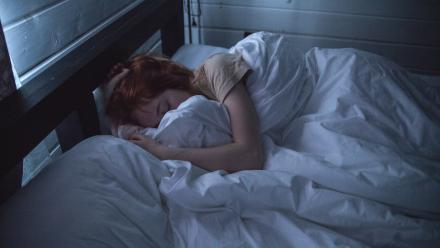Sleep is essential for everyone, but for people living with multiple sclerosis, getting a good night’s rest can be tricky at times. From pain, bladder issues, and anxiety to sleep disorders and restless legs, MS can introduce a range of issues that disrupt sleep and impact overall wellbeing.
We spoke to Charlie Peel, Healthcare Partnerships Lead at Overcoming MS, at the MS Trust annual conference, who shared her top five practical, MS-friendly sleep tips.
Sleep disturbances are common in multiple sclerosis, often caused by symptoms that might not be associated with sleep. Pain and altered nerve sensations, such as burning feelings or muscle stiffness, can feel worse at night and make it difficult to relax. Muscle spasms and restless legs may interrupt your sleep cycles, while needing to get up and visit the toilet several times a night can lead to broken sleep.
Emotional factors can also play a role, some with MS experience anxiety or racing thoughts that make it hard to wind down. In addition, sleep disorders like insomnia and sleep apnoea are more common in MS.
- Speak to your GP or MS team about managing pain, bladder urgency, or anxiety.
- If you suspect a sleep disorder like sleep apnoea or insomnia, seek professional support.
- Track your sleep: A diary or app helps identify patterns and triggers.
- Don’t suffer in silence—there are treatments and strategies that can help.
Believe it or not, a good night’s sleep starts in the morning. Exposure to natural light helps regulate your circadian rhythm, making it easier to fall asleep later.
- Try to get outside within the first couple of hours of waking. Maybe start the morning with a walk, or breakfast in the garden.
- If that’s not possible, sit by a window or use a light box - you can often find one second-hand.
Movement is one of the most powerful tools for better sleep. It’s been proven even gentle exercise can improve sleep quality - sometimes as soon as the first night.
- Whether it’s stretching, walking, or dancing in your kitchen, any movement counts. We have resources on how to get started here.
- Better sleep leads to more energy, which helps you stay active the next day.
Your evening routine sets the tone for sleep. Avoid stimulating activities like watching too intense films, scrolling through news, or using screens late at night.
- Choose calming activities: reading, taking a bath, chatting with a friend, or sitting outside in low light if the weather permits it.
- Create your own wind-down ritual that helps your body and mind relax.
- For more ideas, check out our relaxation page.
Bad nights do happen. And sometimes, a string of them can make bedtime feel so daunting and that you might never get to sleep again! But each night is a new opportunity.
- Don’t let past insomnia define your expectations.
- Approach sleep with gentleness and hope, tonight could be the night things shift.
While these tips are tailored for MS, don’t forget the basics: a cool, dark room, comfortable bedding, and a consistent sleep schedule. For more on traditional sleep hygiene, check out the resources from The Sleep Charity.
Sleep is not just a luxury - it’s a foundation for better MS management, mental health, and daytime energy. Start small, stay consistent, and remember you deserve rest.



